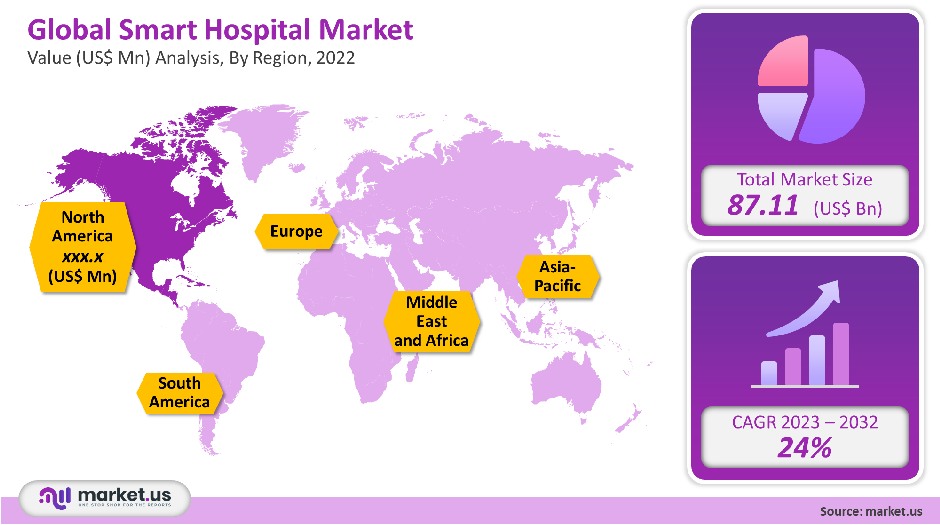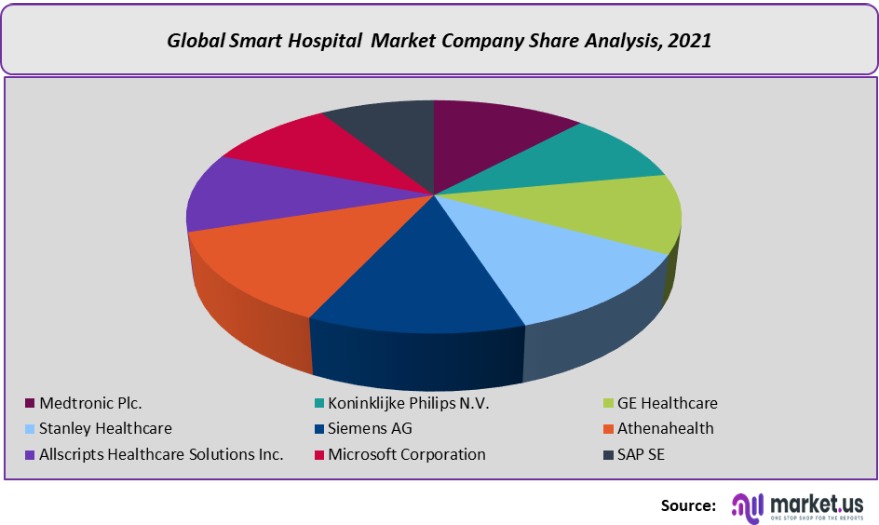Global smart hospital market, by Component (Hardware, Software, Services), by Technology (Cloud Computing, IoT, Big Data, Other Technologies), by Route of Connectivity (Wireless, Wired), by Application (Remote Medicine Management, Medical Connected Imaging, Other Applications)and by Region and Companies Industry Segment Outlook, Market Assessment, Competition Scenario, Trends and Forecast 2022-2032.
- Published date: Feb 2022
- Report ID: 83228
- Number of Pages: 322
- Format:
- keyboard_arrow_up
Smart Hospital Market Overview:
Тhе Smart Hospital Market ассоuntеd fоr UЅD 87.11 bіllіоn іn 2021 and estimated САGR оf 24% оvеr thе fоrесаѕt реrіоd.
Market.US announces the publication of a recently generated research report titled, “Global smart hospital market, by Component (Hardware, Software, Services), By Technology (Cloud Computing, IoT, Big Data, Artificial Intelligence, Wearable Technologies, Radio Frequency Identification, Other Technologies), By Route of Connectivity (Wireless, Wired), by Application (Remote Medicine Management, Medical Connected Imaging, Medical Assistance, Electronic Health Record & Clinical Workflow, Outpatient Vigilance, Other Applications).
This report offers a holistic view of the global smart hospital market through systematic segmentation that covers every aspect of this target market.
A smart hospital is an innovative way to care for patients. It involves the use of one or more connected devices in each room, capable of sending and receiving data to help doctors diagnose and treat a patient. These connected devices in the room could be a tablet or another type of computer. There are also sensors to monitor blood pressure, weight, oxygen levels, and other vital signs. These systems can monitor remote patients through video conferencing as well, thereby reducing travel time and other related expenses. The world’s most advanced healthcare is now available at the touch of a button with the advent of technology-enabled smart hospitals.
A smart hospital is an integral part of a new digital era in healthcare, one in which hospitals embrace innovation in order to provide better patient care with fewer resources. Leading hospitals in North America, the Asia Pacific, and Europe have already adopted this innovative approach. Smart hospitals have many features that make them better equipped to handle the medical needs of their patients.

The features of a smart hospital are wide-ranging. Patients can access their medical records online, doctors can access them remotely, and wearables can monitor a patient’s condition round-the-clock. There are in-hospital apps that connect patients with facilities like pharmacies or food service providers, and to facilities such as MRI machine labs, as a means of reducing wait times.
Recent changes in the healthcare industry have led to more facilities trying to adopt new technologies. Some of these changes include higher costs, fewer beds, and lesser space for medical training. These factors lead to diminishing autonomy for hospitals, which is why some of them are adopting new technology to be competitive. For example, some hospitals are using virtual reality to teach students how to carry out surgical procedures.
Detailed Segmentation :
Based on Component:
- Hardware
- Software
- Services
Based on Technology:
- Cloud Computing
- IoT
- Big Data
- Artificial Intelligence
- Wearable Technologies
- Radio Frequency Identification
- Other Technologies
Based on Route of Connectivity:
- Wireless
- Wired
Based on Application:
- Remote Medicine Management
- Medical Connected Imaging
- Medical Assistance
- Electronic Health Record & Clinical Workflow
- Outpatient Vigilance
- Other Applications
Based on Region:
- North America
- Europe
- Asia-Pacific
- South America
- Middle East & Africa
Market Dynamics
Industry experts across the globe are reporting that the benefits of hospitals running on smart technology are resulting in the provision of excellent patient care experiences.
A recent article by Forbes titled “How Smart Hospitals Can Help Prevent Medical Errors” discussed how new smart technology can prevent medical errors. Forbes noted that one of the most promising applications of smart technology in hospitals is to use sensors to detect changes in vital signs, which for example would help reduce the risk of misdiagnosis or missed diagnosis.
The hospital of the future is here. It’s been a long time coming – hospitals have been technologically outdated for ages. But now, with new technologies being developed, it’s projected that smart hospitals will be the norm over the next decade. They come with a host of benefits for healthcare professionals, patients, and families alike. In a smart hospital, doctors will be able to access patients’ records instantaneously and diagnose potential diseases without ever having to leave their desks.
The need for more efficient diagnostic tools has put pressure on doctors, nurses, and other medical staff to constantly innovate. Smart hospitals are employing IoT technology in efforts to improve their efficiency. The healthcare industry has seen significant changes over the last decade.
People are living longer than ever before, even though an increasing number of them are getting sick with chronic illnesses that may require medical care for the rest of their lives. This higher demand for healthcare services has led to an increase in private industry investments from private equity firms, hedge funds, and funds.
The increased utilization of technology in hospital settings has led to a higher demand for healthcare professionals who are educated in how to use this new technology. Healthcare providers are experiencing a shortage of nurses, with an increasing number of experienced nurses leaving their professions. To fill these positions, many hospitals are hiring nurses from other regions or countries, with different cultural backgrounds and potential language barriers.
In order to maintain a competitive edge in this ever-evolving healthcare industry, hospitals must be able to compete using improving technologies and evolving patient care models. In addition, hospitals must also be able to balance the needs of these different patients, based on where they’re situated. For example, a hospital catering to an area with a large elderly population will have different needs than a hospital nearby serving mostly younger families.
The growing demand for smart hospital technology will play a major role in the increase of “smart” hospitals. The increased ability to use computers and mobile devices has helped hospitals to more efficiently manage their patients and data, saving time and money. An additional benefit is that these technologies can help decrease medical errors. The development of these technologies has been largely driven by requests of healthcare staff, as they are looking for safer, more efficient ways to care for their patients.
The population of the United States is aging and growing at an unprecedented rate, which will result in a need for more healthcare providers. With the demand for medical services increasing and the existing workforces being stretched; hospitals and other healthcare facilities are now looking to implement new technologies to automate some of their processes. As a result, there are opportunities for innovation in this sector as various companies aim to leverage their expertise in automation to construct systems that streamline productivity.
It is predicted that the hospital industry will undergo a revolution of sorts, with more focus on software development that will allow hospitals to work closely with outside vendors. The main goal is to provide better care for patients by integrating digital technology into each facility. This new approach will include big data, robotics, and wearable devices.
Key Developments
The rise in smart hospitals is a result of the need to increase efficiency and ease of use. These hospitals are built with both patients and employees in mind as they incorporate advancements such as touchscreen consoles, digital signage, and interactive displays. With this type of design, patients can remain updated on their care plan and doctors can access vital information about their patients instantly.
Smart hospitals are becoming increasingly popular, which is good for patients and healthcare providers. Computerized hospital floor plans allow for better patient care by reducing the risk of medical errors. The design of a smart hospital is typically based on the needs of the patients, which means that they are able to experience a hassle-free stay in a hospital due to easier access to important areas/information.

Major key players in the smart hospitals market are:
- Medtronic Plc.
- Koninklijke Philips N.V.
- GE Healthcare
- Stanley Healthcare
- Siemens AG
- Athenahealth
- Allscripts Healthcare Solutions Inc.
- Microsoft Corporation
- SAP SE
- Samsung Healthcare
- Honeywell International Inc.
For the XXXXX Market research study, the following years have been considered to estimate the market size:
Attribute Report Details Historical Years
2016-2020
Base Year
2021
Estimated Year
2022
Short Term Projection Year
2028
Projected Year
2023
Long Term Projection Year
2032
Report Coverage
Competitive Landscape, Revenue analysis, Company Share Analysis, Manufacturers Analysis, Volume by Manufacturers, Key Segments, Key company analysis, Market Trends, Distribution Channel, Market Dynamics, COVID-19 Impact Analysis, strategy for existing players to grab maximum market share, and more.
Regional Scope
North America, Europe, Asia-Pacific, South America, Middle East & Africa
Country Scope
United States, Canada and Mexico, Germany, France, UK, Russia and Italy, China, Japan, Korea, India and Southeast Asia, Brazil, Argentina, Colombia etc.Saudi Arabia, UAE, Egypt, Nigeria and South Africa
![Smart Hospital Market Smart Hospital Market]()
- Medtronic Plc.
- Koninklijke Philips N.V.
- GE Healthcare
- Stanley Healthcare
- Siemens AG
- Athenahealth
- Allscripts Healthcare Solutions Inc.
- Microsoft Corporation Company Profile
- SAP SE Company Profile
- Samsung Healthcare
- Honeywell International Inc.
- settingsSettings
Our Clients
|
Single User
$5,999
$2,999
USD / per unit
save 50% |
Multi User
$7,999
$3,499
USD / per unit
save 55% |
Corporate User
$12,999
$4,499
USD / per unit
save 65% | |
|---|---|---|---|
| e-Access | |||
| Data Set (Excel) | |||
| Company Profile Library Access | |||
| Interactive Dashboard | |||
| Free Custumization | No | up to 10 hrs work | up to 30 hrs work |
| Accessibility | 1 User | 2-5 User | Unlimited |
| Analyst Support | up to 20 hrs | up to 40 hrs | up to 50 hrs |
| Benefit | Up to 20% off on next purchase | Up to 25% off on next purchase | Up to 30% off on next purchase |
| Buy Now ($ 2,999) | Buy Now ($ 3,499) | Buy Now ($ 4,499) |








